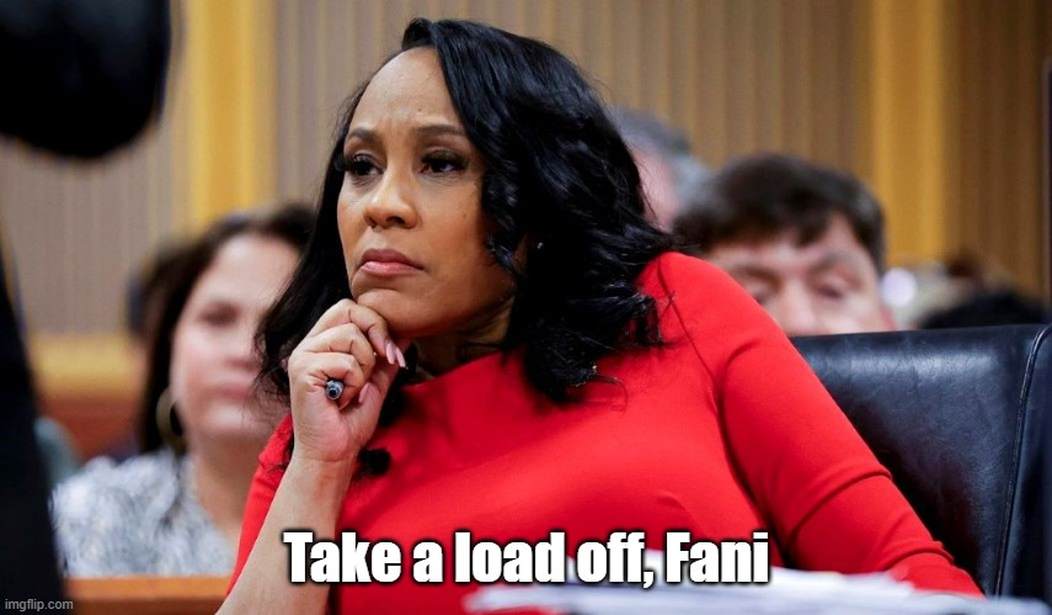Via the indispensable Greg Price, we get this bit of news from Trump’s criminal case in Georgia—the one involving RICO Madness.
BREAKING: Six counts in Fani Willis' indictment against President Trump have been "quashed" by Judge McAfee. pic.twitter.com/Ncg0ZcEhG1
— Greg Price (@greg_price11) March 13, 2024
That highlights a trivial inaccuracy in our headline. The technical name of the motion was a ‘demurrer’ which is pretty much the same thing as a motion to dismiss in many other jurisdictions—including federal courts. Furthermore, the judge didn’t technically dismiss the claim, but quashed it—but it’s just another name for the same thing. We wrote it the way we did because we believe that non-lawyers will be more likely to get what we are talking about.
In any case, Price also helpfully provides a link to the full order:
Full orderhttps://t.co/NF4P6hN3tM
— Greg Price (@greg_price11) March 13, 2024
It isn’t a very long order, so we can summarize this pretty quickly. One of the most basic requirements of due process is notice and an opportunity to be heard. But the notice provided by the indictment has to actually give the defendant half a chance to prepare a defense. That means that in crucial ways it has to provide a sufficient amount of detail.
Let’s give you a practical example. Let’s say that you were indicted tomorrow for murder and the indictment said ‘the defendant did in fact murder a person sometime between 1994 and 2024.’ Well, if that is all you know about the allegation, that isn’t enough to allow you to prepare your own defense. You aren’t told who you murdered or when you allegedly murdered them. How could you possibly begin to defend yourself against a claim like that? For instance, could anyone provide an alibi for thirty years of their life? So if there isn’t enough specificity, that is a cause to dismiss (i.e. quash) a claim.
With that principle in mind, let’s look at the problem in the Trump indictment in Georgia. One of the crimes Trump and his co-defendants are charged with is soliciting a public officer to violate their oath of office. The judge notes that Georgian officials take an oath to support the U.S. and Georgian Constitutions, and the claim is that different defendants basically asked them to violate the state and federal constitutions and Judge McAffee held that this was just too vague:
Recommended
While the averments [allegations by the government] do contain a reference to the terms of the violated oaths, this Court finds that the incorporation of the United States and Georgia Constitutions is so generic as to compel this Court to grant the special demurrers. On its own, the United States Constitution contains hundreds of clauses, any one of which can be the subject of a lifetime’s study. Academics and litigators devote their entire careers to the specialization of a single amendment. To further complicate the matter, the Georgia Constitution is not a ‘mere shadow[]’ of its federal counterpart, and although some provisions feature similar language, the Georgia Constitution has been interpreted to contain dramatically different meanings. … This is in marked contrast with say, aggravated assault with a handgun, which can be perpetrated in only a limited number of ways, and an indictment that merely refers to a handgun is not too vague because it infers that the weapon was used either as a firearm or as a bludgeon.
(Internal citations, quotation marks and footnotes removed.) In other words, saying ‘you asked someone to violate one of these two constitutions’ covers so much potential ground, they could mean anything.
Of course, we have long thought that this was questionable from a constitutional perspective, anyway. People solicit a violation of the Constitution all the time. For instance, just the other day we talked about how the Supreme Court ruled unanimously that Colorado could not take Trump off the ballot. This means that all along the way, the lawyers who lost that case was soliciting the Supreme Court to do something it could not legally do. Yet, no one would think to drag those lawyers off in chains—most basically because people have disagreed on the meaning of the Constitution from pretty much the moment the ink was dry on it. The only way we think that this law could be interpreted in a way that doesn’t violate the right to petition your government for a redress of grievances found in the First Amendment is if they can prove that the person doing the solicitation actually knew what they were asking for was unconstitutional, or limited the solicitation to quid pro quo offers, rather than just asking a person to do something.
Moving on, one person did raise an important point:
Good news, but they still have six months from today to reindict on these six counts. pic.twitter.com/FDdNenCkHB
— Brick Suit (@Brick_Suit) March 13, 2024
He is highlighting text from the opinion that reads as follows:
This does not mean the entire indictment is dismissed. … The State may also seek a reindictment supplementing these six counts. … Even if the statute of limitations has expired, the State receives a six-month extension from the date of this Order to resubmit the case to a grand jury.
(Citations removed.) So, the state can reindict Trump and put more detail into the indictment, solving the current problem, but … there’s another problem, and this is where Professor Turley comes in:
...The defense is allowed discovery and time to prepare for the new alleged crimes. That will take time off the clock. The court has indicated that they can still rely on the underlying conduct to make out the general racketeering charge. However, that theory was alreadly thin…
— Jonathan Turley (@JonathanTurley) March 13, 2024
The cut off text reads:
However, that theory was alreadly thin soup and it just got a bit thinner...
Ugh, Turley is good at many things, but his humor is a bit too milquetoast for our taste. Still, whether or not he is good at being funny is not as important as whether or not he has insight (and he does). He goes on:
...Part of the value of the multiplicity of counts was to convey a pattern criminality as a foundation for the more serious racketeering charges. This does not disable the case, but it adds yet another set back for the prosecution as it awaits the disqualification decision.
— Jonathan Turley (@JonathanTurley) March 13, 2024
So today's decision presents a possible dilemma for the prosecutors: go forward with a significantly weaker case, or reindict and risk losing the ability to try Trump before the election.
The only possible bright spot in today’s decision from the prosecution's perspective is that it makes it less likely that Trump will get the full Fani spanking dismissal of the case due to the Fani Willis scandal, which we are hereby labelling ‘Fanigate.’ We are still waiting to see what McAfee rules on that issue, but many judges would not grant a partial dismissal before resolving an issue that might get the whole case dismissed, unless he or she wasn’t planning to dismiss the entire case. But that is only a tendency among ‘many judges,’ and doesn’t mean this judge will definitely approach things the same way. Indeed, since McAfee is facing a request to reopen the evidence, his current approach might be to keep his mind merely open to the dismissal, after another round of testimony in court. Since at one point, Willis herself asked to reopen the evidence, we find it hard to believe that McAfee won’t reopen the matter for a hearing—unless he thinks he has already heard enough to justify disqualification.
In other words, we don’t feel super confident that this is a sign of the judge’s thinking on Fanigate. But we might look back on it as a sign. We shall see.
Returning to Turley’s point about timing, this isn’t like the Federal cases where Trump could literally hope to push the case back past the election, win the election and then either attempt to pardon himself or otherwise stop the cases. This is a state prosecution and he can’t make it go away that easily. Indeed, we could face a scenario such as Trump being prosecuted while being president of the United States, or Trump being convicted and sentenced to prison while he is also supposed to serve as president.
Now, people have been elected to office and been sentenced to prison. For instance, this is not exactly a moment of pride here in Virginia:
Controversial lawmaker who served time for teen sex scandal wins Virginia state Senate seat https://t.co/EN4HqfbRQu
— Diane (@SoCalValleyGal) November 11, 2019
That case involved Joseph Morrissey, who seduced his underage intern, pled guilty to contributing to the delinquency of a minor and actually served prison while serving as a lawmaker. Literally, he would be let out of prison in the morning, serve in the Virginia Senate during the day, and then go back to the prison at night.
But the President of the United States is a one-of-a-kind office in America. As Hillary Clinton famously pointed out, he or she has to be ready at four in the morning to deal with a crisis. Imagine if on the morning of September 11, 2001, Goerge W. Bush wasn’t reading to schoolchildren, but was instead due in court to defend himself in a criminal case? Even if the court doesn’t require Trump to attend the trial, he has a right to do so and he can’t be said to have a fair trial unless he has a meaningful opportunity to do so. And similar problems arise if they try to go the Morrissey route and try to have Trump serve in prison during his off hours—because for the President of the United States, there are no ‘off hours.’
To say we would be in uncharted legal territory, then, is an understatement. Indeed, this could lead to a constitutional crisis.
Moving on to a few other reactions:
LOSER! Big Fani Willis just had six charges against Trump quashed by the court. https://t.co/chBT6Ru45p
— @amuse (@amuse) March 13, 2024
While it’s past time to remove Willis - her entire case is just one of many attempts to use our courts to interfere in elections.
— Kelly Loeffler (@KLoeffler) March 13, 2024
They decline to prosecute Biden’s actual crimes, but the fact that the Trump cases are allowed to continue is the bigger issue.
This is a… https://t.co/QyNySKzzds
The cut off text reads:
This is a distraction from the serious damage Biden is doing to America.
Of course, we don’t think a court can validly rule that Trump is immune to prosecution because Biden sucks, or something like that, we do think that the courts are giving short shrift, so far, to the notion that they are being used as an instrument to interfere in the election and Trump is the victim of selective prosecution.
If Fani Willis and Nathan Wade were Republicans everyone on both sides would call for their resignations and for the DOJ to investigate them immediately. Our "media" and institution-wide Democrat coddling are national disgraces. https://t.co/cAyR2kUErX
— FOOL NELSON (@FOOL_NELSON) March 13, 2024
Off topic, but he's not wrong.
The walls are closing in. https://t.co/OVbHY8rOnv
— NotYourJewishMom (@CaffMomREDACTED) March 13, 2024
We feel confident that she is being ironic. As a point of fact, the walls have withdrawn slightly, if we are going to use a trash compactor in the original Star Wars metaphor.
And no, George Lucas, we are not calling it ‘Star War: Episode IV: A New Hope’ and you can't make us. Sod off with your overly convoluted revised titles.
Good start.
— Steve Cortes (@CortesSteve) March 13, 2024
Now throw Fani Willis and her lover off the case and end this sham prosecution completely. https://t.co/F8J9RCJV0O pic.twitter.com/CtufRfL7pF
One thing we have observed is momentum is important in legal cases to a degree that doesn’t entirely make logical sense. Right now, Trump actually has some good momentum in his favor.
When will he decide on Willis and Wade? https://t.co/YzF5BOOBgp
— sarainitaly 🐰🌷🐥🌷 (@sarainitaly) March 13, 2024
Bluntly, when he feels like it. Judges are the proverbial 800 pound gorillas.
How embarrassing for Fani Willis. https://t.co/rVRZIj0iHQ
— House Judiciary GOP (@JudiciaryGOP) March 13, 2024
Finally, we get this.
When the booty calls are legit you must acquit
— Stinson Norwood (@snorman1776) March 13, 2024
It’s not actually relevant, but it is pretty funny.
***
Editor’s Note: Do you enjoy Twitchy’s conservative reporting taking on the radical left and woke media? Support our work so that we can continue to bring you the truth. Join Twitchy VIP and use the promo code SAVEAMERICA to get 50% off your VIP membership!

























Join the conversation as a VIP Member